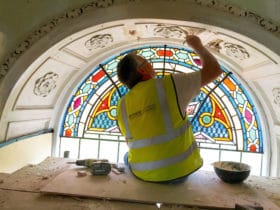

As I write this piece, I have just returned from another excellent Build It Live show in Bicester. As ever, a continuous stream of people approached the Ask Our Experts desks with the usual variety of questions to answer.
Some perennial topics will always be the staple of these events, but the occasional inquiry can evolve into an interesting discussion, which this show delivered. Chatting to a most interesting couple, after answering their initial query, we discussed the provision of services to a property. In particular, the importance of superfast broadband.
With most utilities, there are alternatives: if you don’t have mains drainage, you can install a treatment plant; water can often be obtained via a borehole; and renewables can be substituted in the absence of mains gas. Even electricity is getting close to the point where renewables can replace supply from the National Grid (though it’s not quite there yet). But in the modern world, the availability of fast, reliable broadband has become an essential service for which there is no practical or cost-effective alternative.
Like me, this couple live in a rural area. Friends and relatives in urban spaces have long taken for granted the availability of superfast broadband, due to the widespread use of cable and fibreoptic supply.
For many of us out in the sticks, this remains a dream, though my village has recently been dragged into the 21st Century and we now have fibre to the ‘box’ on the street. For others lower down the Openreach priority list, the lack of superfast connectivity is a serious hinderance; this couple had to arrange for a private broadband link to their village.
You can see the imperative for action. Modern living assumes internet connectivity. Just about all government interaction, commerce and entertainment activity relies on the internet. In the workplace, more people are setting up their own businesses or working flexibly from home. As the push for further carbon footprint reduction takes hold, the concept of millions of us commuting to an energy-guzzling office block five times a week looks pretty antiquated.
But for us in the countryside, the IT upgrade has been painfully slow, although Boris Johnson has pledged to do something to improve things. The survival of rural communities depends on getting superfast broadband installed.
Many of us seek lifetime homes and decent internet would facilitate us staying in our properties for longer. One of the major fears of independent living is that of something serious happening – a fall or a stroke – but not being able to alert anyone, which a strong neighbourhood network could facilitate. Reliable broadband is set to be the cornerstone of community cohesion in both rural and urban areas, but not everyone has it. The more I think about it, superfast broadband is essential and needs to be a higher priority nationally.
